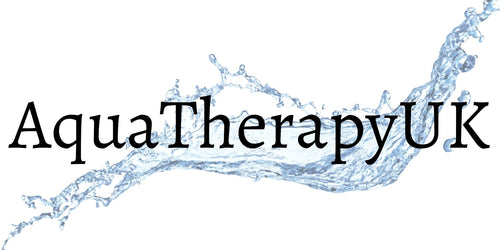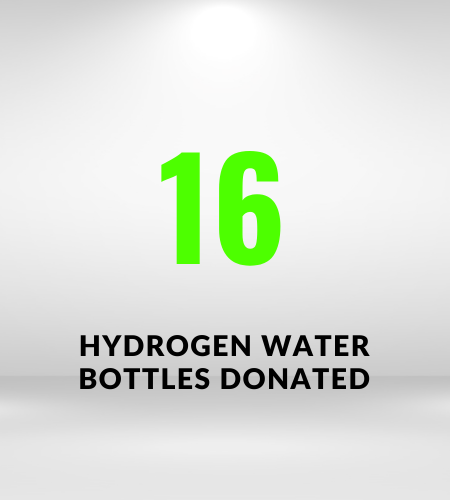What is Hydrogen-Infused Water?
Regular water enhanced with more hydrogen molecules is referred to as hydrogen-infused water, hydrogen-rich water, or HRW. HRW has more molecular hydrogen (H₂) than regular water (H₂O), which is thought to offer potential health advantages because of its antioxidant qualities. It is promoted as a product that may reduce inflammation, improve athletic performance, and even slow ageing, so why people are interested is understandable. However, does hydrogen water live up to the hype? What is it? To assist you in determining whether it is the correct choice for you, let's examine the science, advantages, and disadvantages [1].
How is Hydrogen Water Made?
Two hydrogen atoms and one oxygen atom comprise plain water (H2O). Pure water with added hydrogen molecules (H₂) is known as hydrogen water. The gas hydrogen is non-toxic, colourless, and odourless. Because the body might not be able to absorb hydrogen when it is bonded to oxygen in ordinary water molecules, proponents contend that adding extra hydrogen to water makes it more advantageous than ordinary water. To produce hydrogen water, hydrogen gas is infused into purified water, frequently using sophisticated equipment that is also available for home use. The most common method for producing hydrogen water is electrolysis, which separates water molecules into hydrogen and oxygen and adds dissolved hydrogen gas to the water. It may also be created with magnesium-based tablets that are released when combined with water [2].
Potential Benefits of Hydrogen-Infused Water
1. Antioxidant and Anti-Inflammatory Properties
One of the main reasons people use hydrogen water is its ability to lessen inflammation and oxidative stress. As a selective antioxidant, molecular hydrogen eliminates dangerous free radicals without interfering with vital signalling molecules.
l According to a 2014 review published in Scientific Reports, HRW may lessen oxidative damage in diseases such as cardiovascular disorders, neurological diseases, and metabolic syndrome [3].
2. Improved Metabolic Health
HRW may benefit metabolism, which might help with blood sugar control and weight management.
l According to a 24-week randomized controlled experiment published in Diabetes Research and Clinical Practice, hydrogen water significantly decreased blood glucose, cholesterol, and metabolic syndrome indicators.
l Research published in Nutrition Research [4] shows that after consuming HRW for eight weeks, type 2 diabetic patients' glucose tolerance and insulin sensitivity increased.
3. Enhanced Athletic Performance and Recovery
Athletes and fitness enthusiasts are increasingly investigating hydrogen water for its potential to lessen muscle fatigue and improve recovery.
l A study published in Frontiers in Physiology in 2024 showed that giving trained people intermittent HRW for eight days greatly increased their muscular endurance. HRW may also increase muscle endurance during resistance training, as seen by the participants' better performance in half-squat exercises [5].
l A study published in Biology of Sport in 2021 discovered that consuming HRW for seven days improved trained cyclists' anaerobic test performance. According to the survey, HRW may lessen lactate buildup and muscle fatigue during vigorous exercise since it boosts mean and peak power while decreasing the tiredness index [6].
l A pilot research published in Medical Gas Research (2012) found that consuming HRW before exercise decreased blood lactate levels and enhanced muscular performance after exercise. These results imply that HRW may help reduce muscle pain and promote quicker recovery following intense exercise [7].
4. Potential Benefits for Brain Health
Molecular hydrogen could boost cognitive function and have neuroprotective effects.
l Research showed that daily HRW ingestion reduced age-related learning and memory deficits in an animal model of accelerated senescence [8].
l Studies showed that HRW decreased hyperphosphorylated tau and neurofibrillary tangles, suppressed senile plaques, and avoided synaptic loss and neuronal death, indicating possible protective benefits against neurodegenerative disorders [9].
l A randomized controlled experiment found that a single dosage of HRW increased alertness in sleep-deprived young people, and alterations in brain metabolism were seen [10].
l According to animal research, HRW may have neuroprotective properties that help to improve behavioural deficits linked to autism spectrum diseases [11].
5. Heart Health and Blood Pressure Regulation
l According to research, ascorbic acid and hydrogen-rich water consumption dramatically lowered systolic blood pressure in rats with spontaneous hypertension. This impact was ascribed to a reduction in plasma angiotensin II levels and oxidative stress indicators [12].
l Clinical research shows that adding hydrogen to hemodialysis solutions can improve blood pressure management for dialysis patients. During treatment sessions, the presence of hydrogen improves blood pressure control and reduces inflammatory responses [13].
Potential Risks and Concerns
While hydrogen water has shown promise, there are still some uncertainties and considerations:
1. Lack of Long-Term Studies
l It's crucial to remember that much of the research on hydrogen water is still in its early stages, with many small-scale experiments needing to be confirmed by more significant, longer-term trials.
l Because of the few contradictory study findings, several medical professionals are dubious of the widely held assertions.
l Some research has not shown any discernible advantages. For example, one study in healthy individuals observed no reduction in oxidative stress indicators following hydrogen water drinking [14].
2. Variability in Hydrogen Concentration
l Not all hydrogen water products contain the same amount of molecular hydrogen; some may lose their hydrogen content quickly after opening [15].
3. Potential Hype and Marketing Claims
l Although they are uncommon and usually moderate, some people have complained of heartburn, headaches, diarrhoea, bloating, and loose stool. These symptoms, which are often temporary, might appear, particularly after using hydrogen water for the first time.
l Although uncommon, excessive drinking of any type of water, including hydrogen, may result in electrolyte imbalances [16].
4. Cost Considerations
l The cost of hydrogen water can be substantially higher than that of ordinary tap or bottled water. Pre-packaged 500ml bottles of hydrogen water in the UK usually cost between £2 and £5, making it an expensive substitute for more conventional hydration choices.
l Depending on the manufacturer and features, a home hydrogen water generator might cost between £ 500 and £2,000.
l A more economical alternative is to use hydrogen pills or drops, which may be added to ordinary water and usually cost between £20 and £50 for a month's supply.
l Given these expenses, customers in the UK should assess whether hydrogen water offers sufficient value compared to other antioxidant-rich drinks or nutritional sources and consider the possible advantages against their budget.
5. Lack of Industry Standards:
l The industry has not standardized the amount of hydrogen added to water yet. Because of this, it might be challenging to evaluate goods and identify the best doses because the amounts of hydrogen in various products can change greatly.
Should You Drink Hydrogen Water?
Try hydrogen-infused water if you want to increase your antioxidant intake or improve your metabolism. However, it shouldn't replace a healthy diet, regular exercise, or drinking enough water to stay hydrated. Before adding HRW to their regimen, those with specific medical issues should speak with a healthcare provider.
Conclusion
Research on hydrogen-infused water is exciting since it may have health advantages such as better metabolism, increased athletic performance, antioxidant effects, and possibly neuroprotective qualities. However, more thorough research is needed to verify its long-term efficacy. As with any health trend, it is crucial to approach it with an informed and critical perspective.







